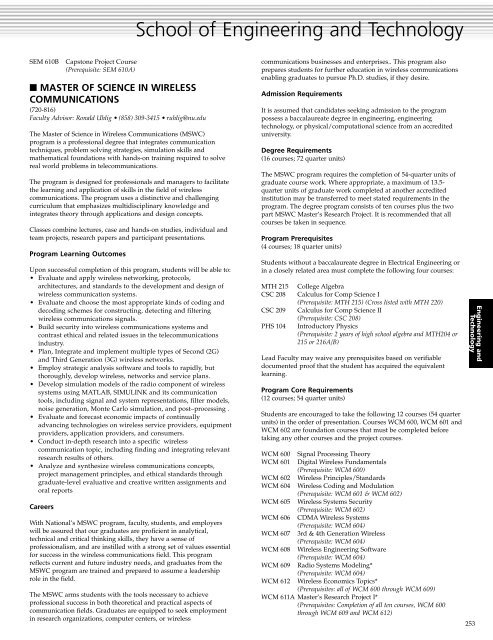Catalog 73 - National University
Catalog 73 - National University
Catalog 73 - National University
- No tags were found...
You also want an ePaper? Increase the reach of your titles
YUMPU automatically turns print PDFs into web optimized ePapers that Google loves.
School of Engineering and TechnologySEM 610BCapstone Project Course(Prerequisite: SEM 610A)■ MASTER OF SCIENCE IN WIRELESSCOMMUNICATIONS(720-816)Faculty Advisor: Ronald Uhlig • (858) 309-3415 • ruhlig@nu.eduThe Master of Science in Wireless Communications (MSWC)program is a professional degree that integrates communicationtechniques, problem solving strategies, simulation skills andmathematical foundations with hands-on training required to solvereal world problems in telecommunications.The program is designed for professionals and managers to facilitatethe learning and application of skills in the field of wirelesscommunications. The program uses a distinctive and challengingcurriculum that emphasizes multidisciplinary knowledge andintegrates theory through applications and design concepts.Classes combine lectures, case and hands-on studies, individual andteam projects, research papers and participant presentations.Program Learning OutcomesUpon successful completion of this program, students will be able to:• Evaluate and apply wireless networking, protocols,architectures, and standards to the development and design ofwireless communication systems.• Evaluate and choose the most appropriate kinds of coding anddecoding schemes for constructing, detecting and filteringwireless communications signals.• Build security into wireless communications systems andcontrast ethical and related issues in the telecommunicationsindustry.• Plan, Integrate and implement multiple types of Second (2G)and Third Generation (3G) wireless networks.• Employ strategic analysis software and tools to rapidly, butthoroughly, develop wireless, networks and service plans.• Develop simulation models of the radio component of wirelesssystems using MATLAB, SIMULINK and its communicationtools, including signal and system representations, filter models,noise generation, Monte Carlo simulation, and post–processing .• Evaluate and forecast economic impacts of continuallyadvancing technologies on wireless service providers, equipmentproviders, application providers, and consumers.• Conduct in-depth research into a specific wirelesscommunication topic, including finding and integrating relevantresearch results of others.• Analyze and synthesize wireless communications concepts,project management principles, and ethical standards throughgraduate-level evaluative and creative written assignments andoral reportsCareersWith <strong>National</strong>’s MSWC program, faculty, students, and employerswill be assured that our graduates are proficient in analytical,technical and critical thinking skills, they have a sense ofprofessionalism, and are instilled with a strong set of values essentialfor success in the wireless communications field. This programreflects current and future industry needs, and graduates from theMSWC program are trained and prepared to assume a leadershiprole in the field.The MSWC arms students with the tools necessary to achieveprofessional success in both theoretical and practical aspects ofcommunication fields. Graduates are equipped to seek employmentin research organizations, computer centers, or wirelesscommunications businesses and enterprises.. This program alsoprepares students for further education in wireless communicationsenabling graduates to pursue Ph.D. studies, if they desire.Admission RequirementsIt is assumed that candidates seeking admission to the programpossess a baccalaureate degree in engineering, engineeringtechnology, or physical/computational science from an accrediteduniversity.Degree Requirements(16 courses; 72 quarter units)The MSWC program requires the completion of 54-quarter units ofgraduate course work. Where appropriate, a maximum of 13.5-quarter units of graduate work completed at another accreditedinstitution may be transferred to meet stated requirements in theprogram. The degree program consists of ten courses plus the twopart MSWC Master’s Research Project. It is recommended that allcourses be taken in sequence.Program Prerequisites(4 courses; 18 quarter units)Students without a baccalaureate degree in Electrical Engineering orin a closely related area must complete the following four courses:MTH 215CSC 208CSC 209PHS 104College AlgebraCalculus for Comp Science I(Prerequisite: MTH 215) (Cross listed with MTH 220)Calculus for Comp Science II(Prerequisite: CSC 208)Introductory Physics(Prerequisite: 2 years of high school algebra and MTH204 or215 or 216A/B)Lead Faculty may waive any prerequisites based on verifiabledocumented proof that the student has acquired the equivalentlearning.Program Core Requirements(12 courses; 54 quarter units)Students are encouraged to take the following 12 courses (54 quarterunits) in the order of presentation. Courses WCM 600, WCM 601 andWCM 602 are foundation courses that must be completed beforetaking any other courses and the project courses.WCM 600WCM 601WCM 602WCM 604WCM 605WCM 606WCM 607WCM 608WCM 609WCM 612Signal Processing TheoryDigital Wireless Fundamentals(Prerequisite: WCM 600)Wireless Principles/StandardsWireless Coding and Modulation(Prerequisite: WCM 601 & WCM 602)Wireless Systems Security(Prerequisite: WCM 602)CDMA Wireless Systems(Prerequisite: WCM 604)3rd & 4th Generation Wireless(Prerequisite: WCM 604)Wireless Engineering Software(Prerequisite: WCM 604)Radio Systems Modeling*(Prerequisite: WCM 604)Wireless Economics Topics*(Prerequisites: all of WCM 600 through WCM 609)WCM 611A Master’s Research Project I*(Prerequisites: Completion of all ten courses, WCM 600through WCM 609 and WCM 612)Engineering andTechnology253
















